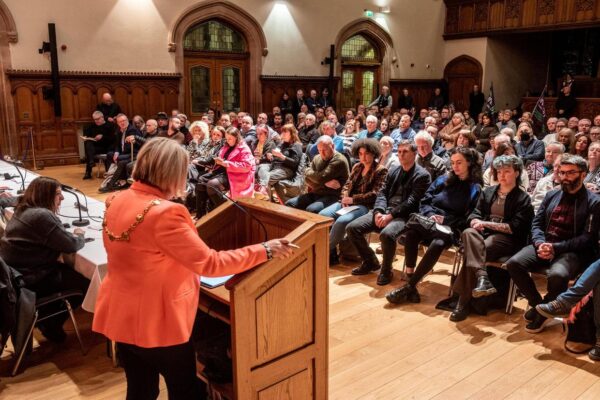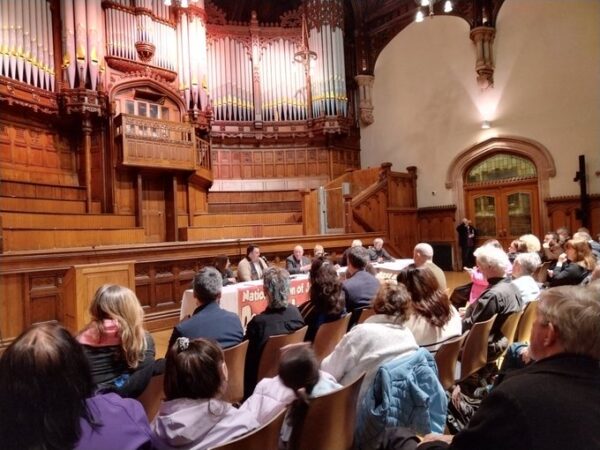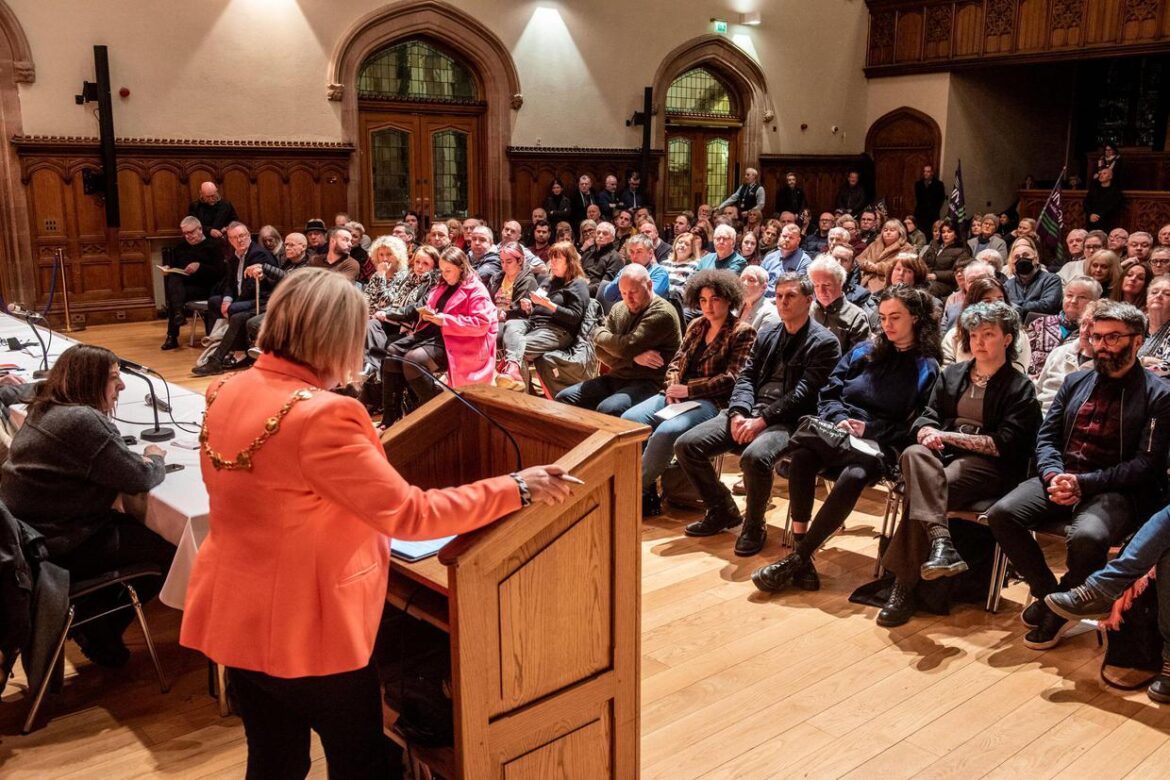
Big turn out at Save Radio Foyle meeting held in Derry’s Guildhall
The community in Derry last night turned out en masse to call on BBC NI to reverse “unthinkable” cuts to jobs and programming at Radio Foyle.
Under current proposals 28 (5%) jobs could be lost from a workforce of 600 in Belfast and eight (27%) at Foyle which would “decimate” a workforce of around 30.
Nationalist and unionist politicians, clergymen and socialists, and others from many different backgrounds united to fill the Guildhall for a meeting organised by the National Union of Journalists (NUJ).
Speaking at the event, Radio Foyle presenter Dean McLaughlin said staff have had to lift each other up over recent weeks. “This is a battle and like our newsroom we are ready to go to the battlefield,” he told the audience.
Ana Leddy ran BBC Radio Foyle from 1998 until 2006 before departing for a role as head of RTE Radio 1.
She told the Belfast Telegraph newspaper the best local radio stations are a window to the world while also holding up a mirror to the community they serve.
Workers at Foyle have been “incredibly high achievers”, she said, showing they are “giant killers” by winning awards when shortlisted against the likes of BBC Radio 4 and BBC 5 Live.
“I find it shocking that the Breakfast News programme could be taken off air along with all of the local news bulletins.
“These aren’t cuts, this a fatal blow to Foyle as a local radio station.
“It will not be a radio station any more.”
Responding to those who say the North West can still be served from Belfast, Ms Leddy said that inevitably where a station is based will get the lion’s share of attention.
A story in the North West would have to be “very big” to make it on to the daily agenda.
“I have been on both sides of cuts and the way they are being proposed for Radio Foyle means they’re not being cut, they’re basically being decimated,” she said.
She said highly-skilled staff at Foyle are “gutted” while the people of Derry will lose workers who shared their stories with fairness and impartiality.
Mayor Sandra Duffy said it is up to people in the city to “raise our voices” to ensure the cuts are not implemented.
SDLP leader Colum Eastwood spoke of Derry being a “unique place” and believed that the planned £420,000 savings could be achieved by means other than cuts.
“People in this city are not about to be pushed around,” he said.
“We will not be lying down and allowing this to happen.”
Former BBC and UTV broadcaster, UUP MLA Mike Nesbitt, said that if the BBC wants to make savings, a fortune could be saved by “cutting out middle management” as he spoke of the various layers of bureaucracy at the public broadcaster.
Fellow broadcaster Joe Mahon, a manager at Radio Foyle in its early days, questioned why at one time the BBC deemed the North West to be “ill-served from Belfast” and deserving of its own platform.
“If anything it is more important now and that has been augmented by the success of the station over that time. The very idea it would be taken away from us is unthinkable,” he said.
 In a further demonstration of cross-community backing for the campaign to save the station, DUP MLA Gary Middleton praised the turnout saying it was a “testament to what Radio Foyle has achieved over the years”.
In a further demonstration of cross-community backing for the campaign to save the station, DUP MLA Gary Middleton praised the turnout saying it was a “testament to what Radio Foyle has achieved over the years”.
In a light-hearted interlude, Bishop Donal McKeown and veteran socialist Eamonn McCann were introduced as men who worshipped in different churches.
The Bishop of Derry said the proposed cuts point to an “existential problem” west of the Sperrins. “We want to see ourselves through our own eyes, not Belfast’s eyes,” he added.
Mr McCann followed immediately after saying: “I’m delighted to say I agree with everything the Bishop has said.”
The lifelong civil rights activist spoke of never being so proud to be a member of the National Union of Journalists and believed it was important for Derry “to win this fight”.
He continued: “It will be a signal to everyone else if we stick together and win this. Derry can give the lead once again.”
A BBC spokesperson said: “We are committed to Foyle as a production centre for local and regional content.
“The savings plans we have announced affect many different people and teams within BBC NI.
“Our engagement with them is ongoing.”
Tags:





